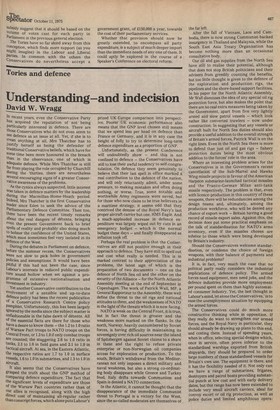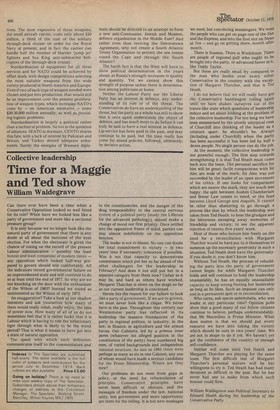Tories and defence
Understanding-and indecision
David W. Wragg
In recent years, even the Conservative Party has acquired the reputation of not being Particularly interested in defence. There are those Conservatives who do not even seem to see defence as an issue at all. Yet, if she is to mean anything at all, Mrs Thatcher has to justify herself as being the defender of traaitional Conservative beliefs, which have for some time been more honoured in the breach than in the observance, one of which is adequate defence. While Mrs Thatcher is still far from playing the role occupied by Churchill during the 'thirties, there are nevertheless several encouraging signs of a greater Conservative awareness of the problems.
As the cynics always suspected, little interest was taken in defence matters by the leadership during the Macmillan-Home-Heath period. Indeed, Mrs Thatcher is the first Conservative leader since Eden to seek the advice of the Parliamentary Defence Committee. Then too, there have been the recent timely remarks about the real dangers of détente, bringing even the present Government back to brief spells of reality and probably also doing much to bolster the confidence of the United States, Which must sometimes feel very isolated in its defence of the West.
During the debates in Parliament on defence, before the summer recess, the Conservatives were not slow to pick holes in government Policies and assumptions. It would have been Pitiful if this had not been the case, since Labour's interests in reduced public expenditure sound hollow when set against a programme of extensive nationalisation and investment in industry.
Yet another Conservative contribution to the evolvement of a sensible and up-to-date defence policy has been the recent publication of a Conservative Research Centre Policy Pamphlet, Unfortunately, this has been largely ignored by the media since the subject matter is unfashionable in the false dawn of détente. All of the essential facts are there for those who have a desire to know them — the 1.2 to 1.0 ratio of Warsaw Pact troops to NATO troops on the Central Front, or 1.3 to 1.0 if only combat troops are counted; the staggering 2.6 to 1.0 ratio in tanks, 2.3 to 1.0 in field guns and 2.1 to 1.0 in tactical aircraft. At sea, in the Eastern Atlantic, the respective ratios are 1.7 to 1.0 in surface vessels, 1.6 to 1.0 in submarines, and 1.5 to 1.0 in aircraft.
It also seems that the Conservatives have grasped the truth about the GNP method of comparing defence expenditure. The fact that the significant levels of expenditure are those of the Warsaw Pact countries rather than of our allies is recognised, along with the high direct cost of maintaining all-regular rather than conscript forces, which alone puts Labour's prized UK-Europe comparison into perspective. Poorer UK economic performance also means that the GNP level chosen still means that we spend less per head on defence than France or Germany, and it is in any case the height of folly to try to determine long-term defence expenditure as a proportion of GNP.
Unfortunately, as the present Conference will undoubtedly show — and this is not confined to defence — the Conservatives have still to lose their awful tendency to self-congratulation. On defence they seem genuinely to believe that their last spell in office marked a real contribution to the defence of the nation, and will only reluctantly admit, under some pressure, to making mistakes and often doing nothing, or worse. True, some notable and worthwhile Army regiments were saved, but for those who now claim to be true believers in a maritime strategy, it seems odd that they contrived the demise of the Royal Navy's last proper aircraft carrier but one, HMS Eagle. And a much-applauded increase in defence expenditure was largely wiped out by cuts in an emergency budget — which is the normal budget these days — and finally disappeared as inflation took off.
Perhaps the real problem is that the Conservatives are still not positive enough in their approach to defence. They have still to spell out and cost what really is needed. This is in marked contrast to their appreciation of the problems, the latest sign of which is the preparation of two documents — one on the defence of North Sea oil and the other on the security of the Alliance — for the North Atlantic Assembly meeting at the end of September in Copenhagen. The work of Patrick Wall, MP, a General Rapporteur to the Assembly, these well define the threat to the oil rigs and national attitudes to them, and the weaknesses of NATO in the light of the threats which it is now facing.
NATO is weak on the Central Front, it is true, but in fact the threat is greater and the weakness more marked on the flanks. In the north, Norway, heavily outnumbered by Soviet forces, is having difficulty in maintaining its sovereignty over rich oil sources near the island of Spitzbergen against Soviet claims to a share in these and the right to refuse private enterprise or non-Norwegian oil companies access for exploration or production. To the south, Britain's withdrawal from the Mediterranean not only imposes a direct military and naval weakness, but also a strong co-ordinating body disappears while Greece and Turkey feud, Italy drifts towards Communism and Spain is denied a NATO connection.
In the Atlantic, it cannot be thought that the disappearance of the immediate Communist threat to Portugal is a victory for the West, since the so-called moderates are themselves of After the fall of Vietnam, Laos and Cambodia, there is now strong Communist-backed insurgency in Thailand and Malaysia, while the South East Asia Treaty Organisation has become nothing more than an occasional consultative body.
Our oil and gas supplies from the North Sea have still to realise their potential, although that does not stop British politicians and their advisers from greedily counting the benefits, but too little thought is given to the defence of the exploration and production rigs, the pipelines and the shore-based support facilities. In his paper for the North Atlantic Assembly, Mr Wall dismisses the idea of any special oil rig protection force, but also makes the point that there are no real extra measures being taken by the Government, apart from five very lightly armed and slow patrol vessels — which look rather like converted trawlers — now under construction. In suggesting that any vessels or aircraft built for North Sea duties should also provide a useful addition to the overall strength of Britain's armed forces, Patrick Wall is on the right lines. Even in the North Sea there is more to defend than just oil and gas rigs — fishery protection duties being the most obvious addition to the forces' role in the area.
Where an interesting problem arises for the Conservatives is in the Government's recent cancellation of the Sub-Martel and Hawks Wing missile projects in favour of the American Harpoon submarine-launched tactical missiles and the Franco-German Milan anti-tank missile respectively. The problem is that, even with licence-production in this country of these weapons, there will be redundancies among the design teams and, ultimately, among the production workforce, who will be denied any chance of export work — Britain having a good record of missile export sales. Against this, the decision does put some practical emphasis on the talk of standardisation for NATO's arms inventory, even if the missiles chosen are inferior to those which were being developed by Britain's industry.
Should the Conservatives welcome standardisation, or condemn the choice of foreign weapons, with their balance of payments and industrial problems?
It is, in fact, very much the case that no political party really considers the industrial implications of defence policy. The armed forces need equipment, men need jobs, and the defence industries provide more employment per pound spent on them than highly automated consumer industry. Yet, the last thought in Labour's mind, let alone the Conservatives,' is to ease the unemployment situation by equipping the armed forces.
The Conservatives could do much more constructive thinking while in opposition. If they really do want to strengthen our armed forces, and the Royal Navy in particular, they should already be drawing up plans to this end, and costing them. Instead of spending years, when in office, selecting special designs which, once in service, often prove inferior to the standardised warships exported from British shipyards, they should be prepared to order large numbers of these standardised vessels for Britain's own use. The equipment is there, and it has the flexibility needed of it. Not only can we have a range of submarines, frigates, destroyers and patrol boats providing substantial punch at low cost and with early delivery dates, but this range has now been extended to include very small aircraft carriers, ideal for convoy escort or oil rig protection, as well as police duties and limited amphibious opera tions. The most expensive of these weapons, the small aircraft carrier, costs only about £20 million, a third of the cost of the solitary through-deck cruiser on order for the Royal Navy at present, and in fact the carrier can handle half the number of Harrier 'jump jet` fighters and Sea King anti-submarine helicopters of the through-deck cruiser.
Standardisation of equipment for all three services and for NATO could be achieved by offset deals, with design competitions selecting the most suitable weapons from the wide variety produced in North America and Europe. Even if two of each type of weapon needed were chosen and put into production, that would still be an improvement over the present proliferation of weapon types, which increases NATO's costs by — on American estimates — some $20-30,000 million annually, as well as providing logistic problems.
Standardisation is largely a political rather than a technical problem. So too is the question of alliances. SEATO is dormant, CENTO shares this fate, with a lack of interest by Pakistan and Britain, and -Turkey denied adequate armaments. Surely the energies of Western diplo mats should be directed to an attempt to form a new anti-Communist, Jewish and Moslem, defence organisation in the Middle East? And rather even than reviving the Simonstown Agreement, why not create a South Atlantic Treaty Organisation to protect the sea routes round the Cape and through the South Atlantic?
The harsh fact is that the West will have to show political determination in the years ahead, as Russia's strength increases in quality and quantity. Yet we cannot show this strength of purpose unless there is determination among politicians at home.
Neither the Labour Party nor the Liberal 'Party has an interest in defence, any understanding of its role or of the threat. The Conservatives do have an understanding of the threat, but the party as a whole has still to show that it once again understands the object of defence, and has much more to do before it can truly be said to have a real interest in defence. Lip-service has been paid in the past, and may continue to be paid, but the time really has come for sound policies, followed, ultimately, by decisive action.



































 Previous page
Previous page